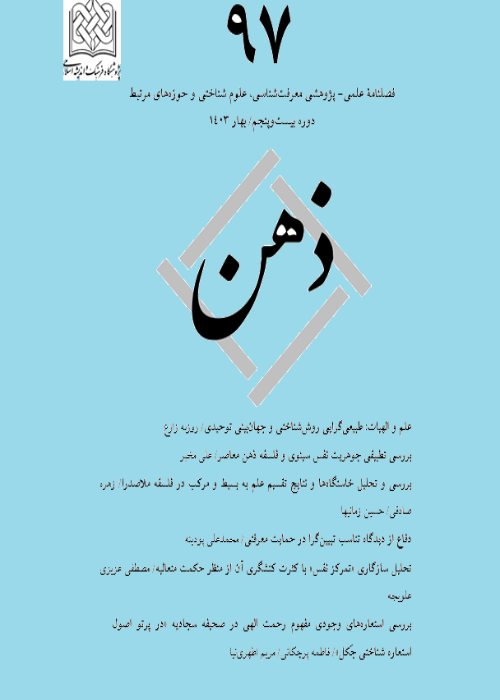Intuitive knowledge and its components based on Sadra's Philosophy
The main issue dealt with in this article is the nature of “intuitive knowledge” and its components based on Sadra’s wisdom. Intuitive knowledge is one of the most prominent teachings in Sadra’s wisdom and owing to its function in Sadra’s wisdom, it deserves to be studied. Intuitive knowledge as well as intellectual knowledge has a history; but Mulla Sadra’s prominence is in the simultaneous use of those two types of knowledge, and this has made the “transcendent theosophy” unique as a philosophical system offering intuitive knowledge to argumentative expression. Intuitive knowledge is the fruit of the mystic’s revelation, which is obtained through cultivation of soul, and its origin, that is, revelation, manifests itself as present knowledge and is thus infallible. But its findings as a report, interpretation and judgment are of the acquired knowledge type and are fallible. Hence, its correctness depends on two criteria of intellect and religious sources (the Holy Quran and the Islamic Tradition). The depth of intuitive knowledge has made it significant in terms of epistemology. This has led to the fundamental function of intuitive knowledge in producing ontological notions. The most important of these functions are: the development, completion, correction, consolidation and deepening of the teachings of transcendent theosophy. This article, while explaining the nature and place of intuitive knowledge in Sadra’s wisdom, deals with its importance to Mullah Sadra. One of the important and inseparable components of Mulla Sadra epistemology is intuitive knowledge—to the extent that intuitive knowledge cannot be separated from transcendent theosophy. Although the discussion of intuition seems to be specific to mysticism, intuitionism in Islamic philosophy has a long history. The mystical inclinations of Sheikh al-Ra’is, who is the banner of peripatetic wisdom, are proof of this claim in works such as Risalat fi al-Ishq and his allegorical stories such as Hayy Ibn Yaqzan, Salaman and Absal and the treatise of al-Tayr, as well as the last three chapters of signs and warnings. The current of intuitionism in Islamic philosophy was revived with the advent of Suhrawardi—to the extent that revelation and intuition were considered as the main method of reaching the truth and argument was recognized as its confirmation and the way of teaching and understanding philosophy. Suhrawardi was the first philosopher to rationally explain his revelations. The titles of Mulla Sadra’s books such as Asfar Arba’a, Al-Shawahid al-Rububiyyah, Mafatih al-Ghayb, Al-‘Arshiyah, Al-Masha’ir, etc. indicate his mystical inclinations. Mulla Sadra does not consider dealing with purely theoretical issues as a matter of reassurance and believes that bringing such material is merely a prelude to understanding and receiving noble and accurate material. Intuitive knowledge is the fruit of the mystic’s intuition and revelation; therefore, in this article, first intuition and revelation are defined and its types are expressed. In this article, the sources of knowledge are expressed in Sadra’s view and the position of the knowledge of intuition among them is briefly examined. Then the characteristics of intuitive knowledge are expressed. In the next part of the article, the criteria of intuitive knowledge are examined. The functions of intuitive knowledge in the Sadra’s system are another important part of the article. Then the proof of intuitive knowledge in Sadra’s wisdom is analyzed. The last part of the article will also deal with the sum of argumentative knowledge and mystical knowledge A number of articles have been written in this regard. In none of these articles is the nature of intuitive knowledge discussed in detail. But in this article, the characteristics, measures and functions of intuitive knowledge are discussed extensively.
- حق عضویت دریافتی صرف حمایت از نشریات عضو و نگهداری، تکمیل و توسعه مگیران میشود.
- پرداخت حق اشتراک و دانلود مقالات اجازه بازنشر آن در سایر رسانههای چاپی و دیجیتال را به کاربر نمیدهد.



